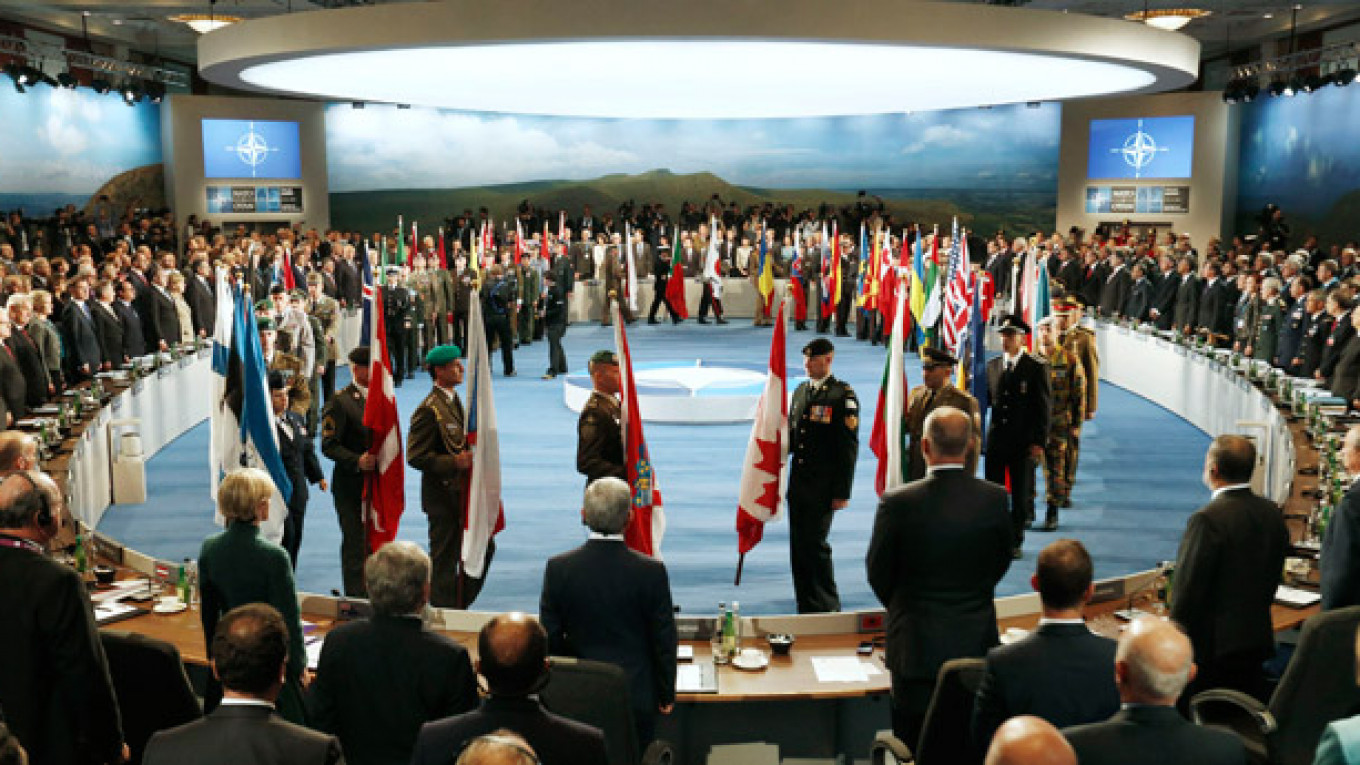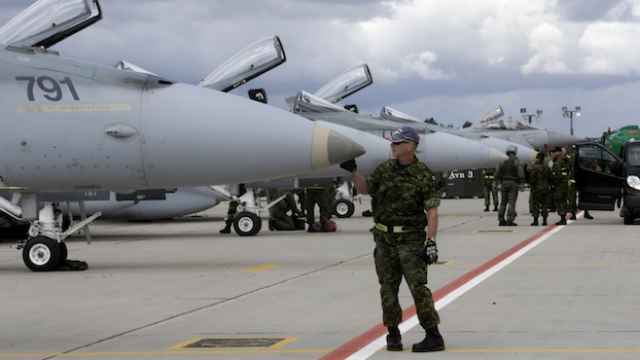On the eve of the NATO summit presently under way in Wales, U.S. President Barack Obama gave the alliance's eastern European members a soaring assurance of protection from any Russian threat. But Poland and the Baltic states are seeking more than lofty words: They want permanent bases with troops on their land.
And they probably won't get that.
While the request from Poland, Latvia, Lithuania and Estonia will be on the agenda at the summit in Wales, European heavyweight Germany and other members strongly oppose it. They argue that it would violate a 1997 agreement with Russia in which NATO pledges not to put "substantial combat forces" in Central and Eastern Europe.
The eastern NATO members suspect, however, that the accord with Russia is just a cover for not wanting to further damage economic relations. And Poland argues that the agreement, known as the Founding Act, has already been invalidated by Russia's annexation of Crimea.
Speaking in the Estonian capital, Tallinn, Obama declared on Wednesday: "You lost your independence once before. With NATO, you'll never lose it again." While that will be a heartening message for Poland and the Baltic states, there were no details of the kind of action that might back it up.
Germany has been specific about what it will not mean. In Latvia last month, German Chancellor Angela Merkel said there will be "no permanent stationing of combat troops" on the alliance's eastern edge. While saying that she understands the concerns of the eastern members, she stressed that "we have … a NATO-Russia act that for the moment I do not want to overstep."
Days later Poland's defense minister, Tomasz Siemoniak, seemed resigned that the Sept. 4-5 summit would agree on lesser measures, such as rotations of NATO troops into the region and the pre-positioning of supplies there so NATO could react more quickly if attacked.
"This concept is OK with us. We don't want to make a fetish of the word 'permanent,'" Siemoniak said in an interview with the Rzeczpospolita newspaper.
NATO leaders are expected to agree on the creation of a rapid response force, a military unit that would be capable of deploying quickly to Eastern Europe. The plan includes the pre-positioning of equipment and logistics facilities in the region that would enable NATO to react quickly.
But it is less than the two heavy combat brigades that Polish Foreign Minister Radek Sikorski had called for in the spring — and it is clear that many Eastern Europeans are bitter.
Many Poles feel that the West treats it as a second-class NATO member in an attempt to appease Moscow. And they say it is unjust that Poland has helped its allies by sending troops to Afghanistan and Iraq, but is being denied the security guarantees it now feels it needs.
"When a dangerous and unpleasant task has to be performed, like sending thousands of troops across the world, Poland is told by its allies that it is in the West. It is there 100 percent, without a doubt and without baggage from the time of Soviet domination," commentator Jerzy Haszczynski wrote in Rzeczpospolita. "Everything changes when it's not Poland that has to do something, but the old West that has to do something for Poland."
Polish leaders have been arguing for months that it makes no sense for NATO to keep significant bases in places like Germany and Italy, far from any apparent threats, while keeping none on NATO's eastern flank now that Russia is growing more threatening.
Sikorski says that Poland only wants what West Germany had during the Cold War, when U.S. troops were stationed there as a deterrent to the sizable Soviet forces in East Germany.
"I am not saying that this is a new Cold War or that we are back to this kind of confrontation," Sikorski said in a recent interview with new site Ozy.com. "But the forces that we are asking for are 1 percent of what [Germany] had in the 1980s."
There is no doubt that cash-strapped NATO members are also hesitant to commit to bases that could be there for years or decades. And those that have bases will be hesitant to give up the jobs and other economic advantages they bring. For instance a permanent transfer of airmen from the NATO base in Aviano, Italy, to Eastern Europe would have ramifications in the area as Italy battles recession.
Romania, which is likewise nervous about Russian aggression in the Black Sea region, is also discussing plans for NATO to base fighter planes and personnel there. President Traian Basescu said Wednesday that 200 NATO pilots, mechanics and maintenance personnel will be stationed in Romania.
The Founding Act was signed in 1997, after the Soviet Union collapsed and NATO and a democratizing Russia were seeking a partnership. The agreement states that the two sides "do not consider each other as adversaries" and would work for lasting peace. They vow not to use force against each other or to violate the territorial integrity or independence of any other state.
And to appease Moscow, which was opposed to the expansion of NATO into parts of the former Soviet bloc, NATO agreed not to put substantial combat forces in the region.
"From the outset, countries like Poland were skeptical about an explicit pledge since it would create a kind of two-tiered alliance," said Jacek Durkalec, a defense analyst with the Polish Institute of International Affairs.
Liana Fix, an associate fellow at the German Council on Foreign Relations, said that Germany's resistance to breaking with the Founding Act comes from a broader respect for treaties and other international obligations. Not provoking Russia with bases near its borders would also give Moscow room to back down from its confrontational approach, something Merkel's words in Riga seemed to suggest when she said that she wouldn't overstep the act "for the moment."
"Germany wants to remain within the framework of international rules. Otherwise Russia can always argue that 'it wasn't us who violated international rules and norms, but it was you who violated this treaty,'" Fix said. "So I think a lot more would have to happen before Germany would actually agree to violate this treaty — even though Russia has already violated it."
A Message from The Moscow Times:
Dear readers,
We are facing unprecedented challenges. Russia's Prosecutor General's Office has designated The Moscow Times as an "undesirable" organization, criminalizing our work and putting our staff at risk of prosecution. This follows our earlier unjust labeling as a "foreign agent."
These actions are direct attempts to silence independent journalism in Russia. The authorities claim our work "discredits the decisions of the Russian leadership." We see things differently: we strive to provide accurate, unbiased reporting on Russia.
We, the journalists of The Moscow Times, refuse to be silenced. But to continue our work, we need your help.
Your support, no matter how small, makes a world of difference. If you can, please support us monthly starting from just $2. It's quick to set up, and every contribution makes a significant impact.
By supporting The Moscow Times, you're defending open, independent journalism in the face of repression. Thank you for standing with us.
Remind me later.






